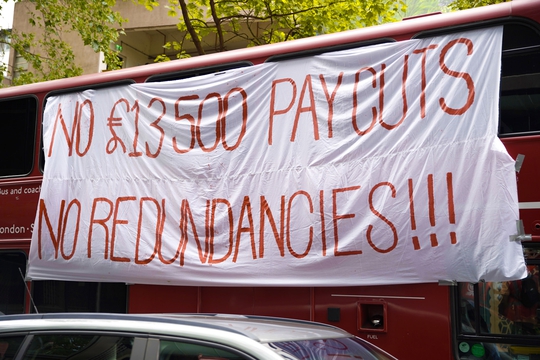Introduction: Planning Our Escape
by
Notes from Below (@NotesFrom_Below)
December 28, 2023
Featured in The Political Leap: Communist Strategy Today (#19)
An introduction to our issue The Political Leap: Communist Strategy Today

theory
Introduction: Planning Our Escape
by
Notes from Below
/
Dec. 28, 2023
in
The Political Leap: Communist Strategy Today
(#19)
An introduction to our issue The Political Leap: Communist Strategy Today
In January 2022, COVID-19 restrictions were still in place, Russia had yet to invade Ukraine, and Boris Johnson was Prime Minister. The political coordinates of that moment were radically different from the ones we can see in front of us today. Whereas our lives then were dominated by the recent experience of the pandemic, our lives now are structured around rampant inflation, accelerating ecological collapse, proliferating war, and a strike wave that reversed 40 years of decline. But even these changes are just the visible symptoms of a deeper change. The long, slow crisis that began in 2007-8 has begun to pick up the pace. September 2023 saw the world experience temperatures 1.8 degrees above pre-industrial norms. That number reminds us of the old climate slogan: “1.5 to stay alive.” The ground is shifting under our feet.
One of the simplest premises of class composition theory is that changes in the shape of capitalist social relations must lead to changes in the political expression of the working class. Just as the strategies of Chartist workers who marched up onto the moors of England to discuss the fight for suffrage were defined by the experience of living and working in the cotton mills and slums of industrial Manchester, so the strategies of the working class today must be defined by our current experiences of working, renting and getting by. And yet all we can see around us are political strategies that have failed to adapt to changing conditions. To make matters worse, the advocates pushing for these strategies seem unable to even recognise the reasons for their failure. The state of the contemporary leftist debate on strategy was demonstrated during a primetime panel debate at The World Transformed earlier this year, which saw a prominent panellist spend most of the evening simply calling the audience members cunts.
We don’t make this critique from a position of abstract superiority. As detailed in this issue, the last five years have seen us make our own mistakes. Different editors have been involved in different projects, but on reflection we can see how all of us fell victim to our own strategic mistakes. These failures can be grouped into two camps: electoralism and syndicalism. By electoralism we mean entering into the Labour Party on the basis that there were opportunities to work within a mass movement to go beyond the limits of bourgeois politics. In reality, those of us who attempted this found ourselves increasingly forced into alliances within the party machine, and unable to provoke the connections and developments of working class self organisation which would have made our initial ideas feasible. By syndicalism we mean becoming deeply embedded within the trade union movement without any form of external political organisation. From this position, we found ourselves struggling to merge economic and political struggles because of the objective barriers created by both authoritarian capitalist management and more subtle trade union proceduralism. This challenge was exacerbated by our lack of external political coordination. We discuss both failures further in the issue, and analyse how we can overcome them. Such reflection is urgent because of the very real contradiction between an accelerating crisis and a movement in disarray. That’s why we have commissioned this issue on the specific question of communist strategy; not strategy as it has been debated historically, but as it exists in our specific class composition today.
Our previous 18 issues have focused on using the method of workers’ inquiry to understand ongoing shifts in class composition. Inquiry, however, is only ever a moment in a wider process of struggle. We inquire in order to understand how we should act. The process is incomplete if inquiry never develops into agitation, and if agitation does not contribute to a wider process of working-class self-organisation. In the pages that follow, the authors focus explicitly on those questions of agitation and organisation.
In Syndicalism and the New Limits of Trade Unions, Roberto Mozzachiodi and Matthew analyse the relationship between communists and trade unions in an era of declining membership and authoritarian managerialism. They identify how militants have ended up regrouping within trade unions, and there encountered the structural limits of purely economic struggle. They articulate a new critique of the institutionalisation of industrial conflict by trade unions, and point the way towards new forms of action that seek to unite rank-and-file workers around a merged political-economic class struggle, and go beyond the syndicalist impasse.
In Now the Dust has Settled: Corbynism in retrospect, Callum Cant reflects on the experience of the left within the Labour Party from 2015, describing the dominant strategies, the actors that pursued them, and how they developed over the course of the Corbyn leadership. He concludes that the current he was part of, which pursued a horizon of ‘counter attack socialism’, failed to ever put itself in a position to accomplish its goals, and criticises the remaining theorists of post-Corbyn Labourism for their failure to consider the objective factors that impede social democratic strategies today.
In A New Feminist Offensive: An interview with Aviah Sarah Day, Aviah reflects on her experience organising within social movements on issues of gendered violence, and how experience prompted her to develop a critique of the state and a broader abolitionist politics. She identifies the role of culture and accessible space in reproducing movements, and the need for an organisation connected to but separate from the trade union movement that can articulate the connections between struggles and lead confrontations with the state.
In Anti-Racism from Below: An interview with Joshua Virasami, Joshua describes how post-2019 anti-racist movements have succeeded in leading mass mobilisations and ideologically challenged the state. He reflects on the struggle between top down and bottom up approaches to anti-racism, and the need for political organisation to fully capitalise on initial gains. He emphasises the role of conjunctural analysis, political education, and pragmatic utopianism in successful movements.
In Get a Job and Organise It: an anonymous Starbucks worker recounts the early days of the Workers United campaign in Buffalo, New York, and the role “inside-organisers” or workplace salts played in getting it moving. They discuss how a strategy of rank-and-file shop floor organising and the legal might of a major union combined to take on a giant corporation.
In Building Cadre: An interview with the Communist Caucus, three comrades from the US (Ben M, Sarah M, and Rain S) discuss how they have built a caucus orientated towards worker and tenant organising within the Democratic Socialists of America. They detail the practical ways in which they have brought together cadre to conduct the ‘spadework’ necessary for a wider upsurge in struggle.
In Notes on Organisation, Revisited, Sai Englert returns to an argument he first made in Notes from Below in 2020, arguing against the substitution of ‘revolutionary’ sects for the working class. Instead, he proposes that the task facing militants today is to develop forms of organisation that allow us to learn from the reality of the class struggle, support working class self-organisation, and agitate for the merging of economic and political demands.
Finally, in our editorial, The Organisational Question, the editors reflect on what we have learned from our contributors, and begin to carve out some open-ended answers to the strategic questions that face us today as communists.
All of these articles respond to the class composition that characterises our new, deteriorating conjuncture. Capitalism is in the throes of numerous crises – political, economic, climatic. A scan of the headlines of any news website, on any given day, gives the willing observer a clear snapshot of the seriousness of our current moment. Catastrophic ecological events – earthquakes, forest fires, floods, droughts – wrack the four corners of the planet. War and the drums of future wars bring death and destruction, while the associated interruptions in global trade lead to growing poverty and food shortages around the world. Forced to move by these realities, amongst others, migrants search for better lives in the wealthy centres of the globe, only to be met with militarised borders and internment camps, while rivers and seas are turned into their killing fields. Everywhere authoritarian repression and the far-right are on the march, if not in power. Coercion is the order of the day. Consent is too brittle to maintain a system decaying under its own contradictions.
We want to find a political strategy that is adequate to this moment. Rather than ignoring the implications of the crisis and sticking to what we know, we are willing to break new ground. This issue contributes to this process of turning revolution from a throwaway phrase into a serious horizon. As we have said to each other many times over the past few months: we don’t want to look back in ten years time and wonder why we didn’t have the courage of our convictions.
Accepting this challenge isn’t easy. It means collectively deciding to take risks that we need not otherwise take; because, now as ever, it’s called class struggle for a reason. But we have an absolute conviction that this is the necessary historical task ahead of us. It’s not good enough to crack jokes about the end of the world - we have to stand together and try to create a new one.
author
Notes from Below (@NotesFrom_Below)
Subscribe to Notes from Below
Subscribe now to Notes from Below, and get our print issues sent to your front door three times a year. For every subscriber, we’re also able to print a load of free copies to hand out in workplaces, neighbourhoods, prisons and picket lines. Can you subscribe now and support us in spreading Marxist ideas in the workplace?
Read next

Syndicalism and the New Limits of Trade Unions
by
Roberto Mozzachiodi,
Matthew
/
Dec. 28, 2023

